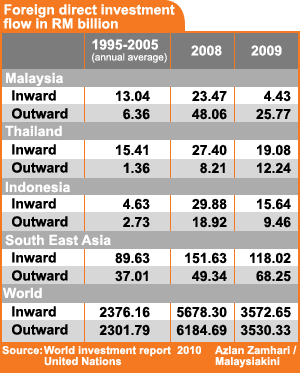Nazir Razak is a banker and managing director of the financial group CIMB.
He cautioned that ‘the 2009 plunge in Malaysia’s foreign direct investment (FDI) needed to be studied carefully before jumping to conclusions’. He reinforced: ‘I don’t think we should be jumping and getting overexcited about this investment data that’s come out.’
This was reported yesterday in The Malaysian Insider.
Setting aside the question of whether the data is correct or whether we should be worried about it, it is clear that we have enough reason to be livid about Nazir Razak's misleading remarks about the data itself.
Read Nazir Razak's interpretations of the FDI inflow and outflow values for Malaysia, as reported:
‘It could be a big, lumpy Malaysian investment overseas that distorts the net [FDI] number’.
He cited CIMB and Maybank’s ‘huge’ investments into Indonesia as possible factors that contributed to lower FDI figures so far this year.
It is remarkable that no one had offered to correct what is an erroneous reading of the data that cannot simply be blamed on mere textual mistake in a speech script.
Making such obtuse and misleading interpretations (or the publication of a news report that conveys such an impression) only dents Nazir Razak's qualification and credibility as the head of a major private financial institution and public policy figure.
The FDI figures for Malaysia that are being disputed are as presented in the table below.

Whatever the FDI values, observe that:
1. No amount of ‘big, lumpy Malaysian investment overseas’ (i.e., outflow) can ‘distort’ FDI inflow as has been implied. FDI inflow, the variable of concern, is a separate variable. There is, of course, the possibility that the flow of domestic money overseas could be read as capital flight borne out of panic which then discourages incoming investment.
But a time lag is required to make such a reading and such an event is unlikely unless the ‘Malaysian investment overseas’ referred to was widely seen as fleeing capital and there are other accompanying economic signals of alarm.
2. ‘Huge’ investment overseas does not necessarily lead to ‘lower FDI figures’. In fact, net FDI figures can be higher (instead of being lower) if inflow sufficiently exceeds whatever huge outflow that occurs. If by ‘FDI figures’ Nazir Razak is referring to FDI inflows, then realise that FDI inflows and outflows at the national level are not zero-sum values where if there is a higher outflow there must be a correspondingly lower inflow (the converse is however true at the global level where inflows roughly equate with outflows).
In any case, the net FDI figure, if that is what is referred to by Nazir Razak, is not the issue. It is the FDI inflow that is. The net FDI figure can be zero even for an economically robust country which has a high FDI inflow (a large flow of funds into the country because of investor confidence) and an equally high FDI outflow (domestic corporations that are able to seek out high returns elsewhere).
3. If outgoing investment was unusually ‘huge’, then FDI outflow figure should have stood out compared to the values for previous years or for other countries but it did not.
4. Even if CIMB and Maybank (both domestic companies) had invested what they had invested in Indonesia within Malaysia instead, these investments would have been recorded as private investments, not foreign investments; these sums would not enter the national accounts under the category 'FDI inflows'.
Thus CIMB and Maybank's overseas investments do not and cannot explain the low FDI inflow (unless these companies are registered overseas and are considered foreign entities).
It is therefore irresponsible for people who command public attention in the policy sphere such as Nazir Razak to issue the unstudied statements that he did, if they were reported correctly. For this could only be construed as mischievous spin-doctoring.

